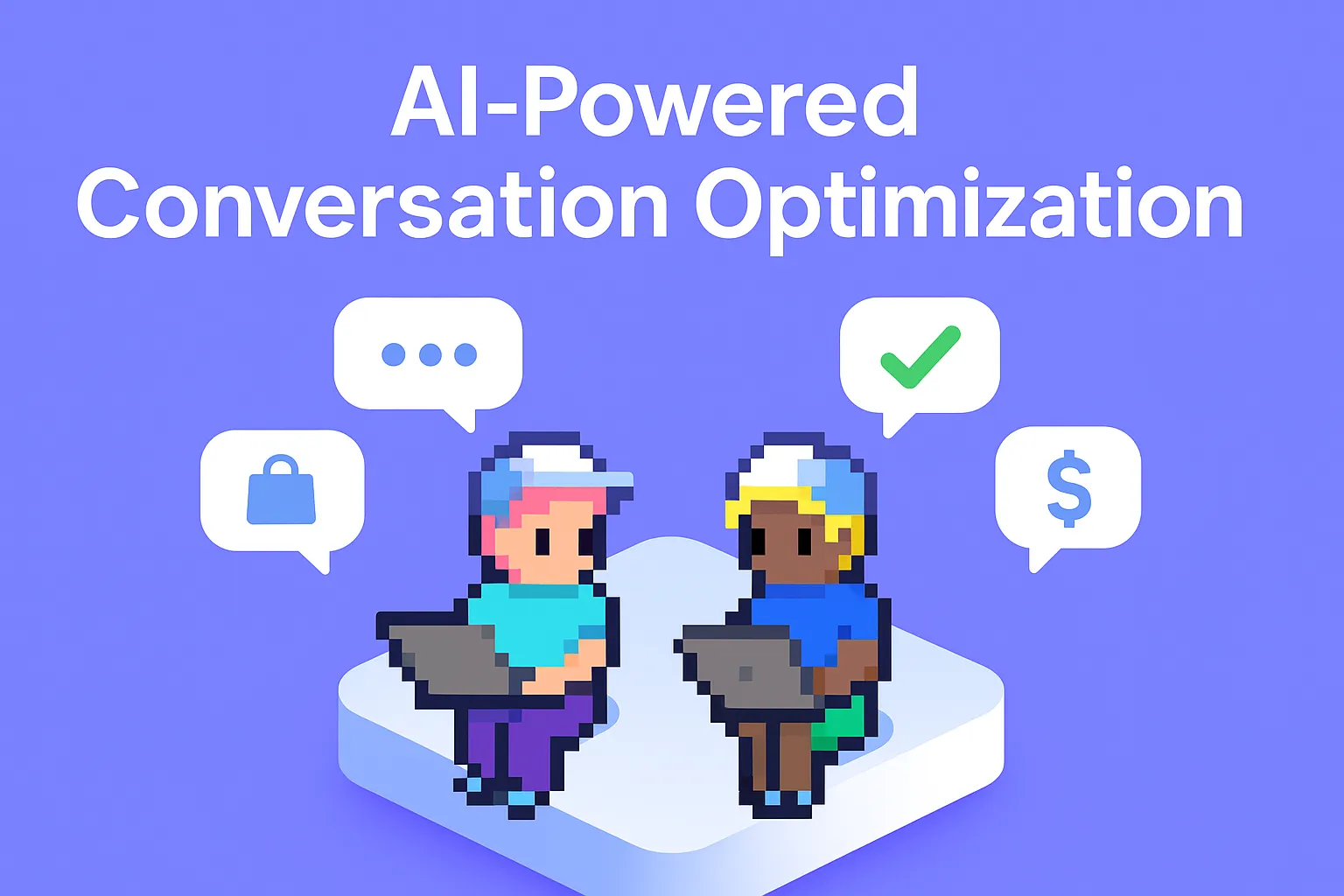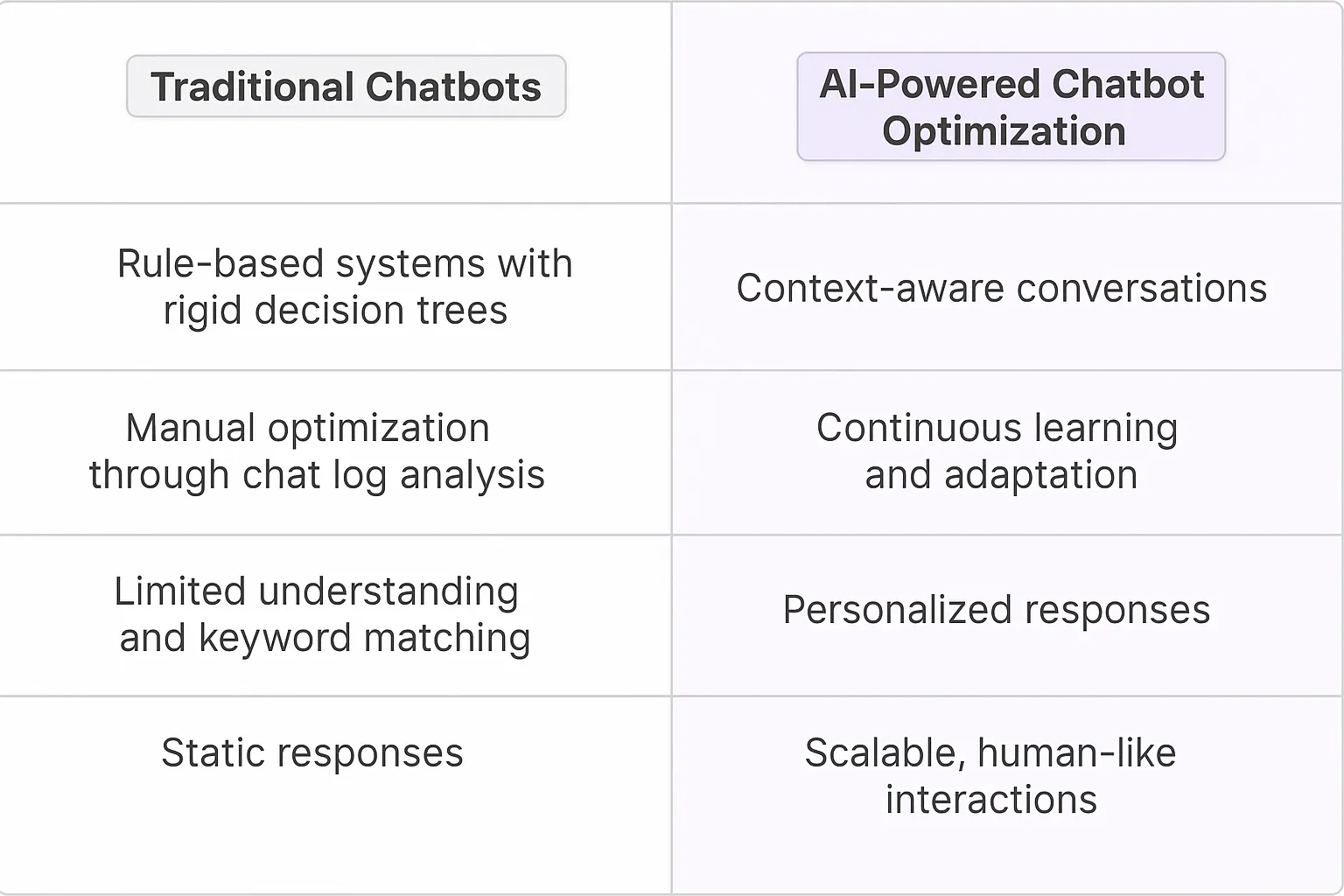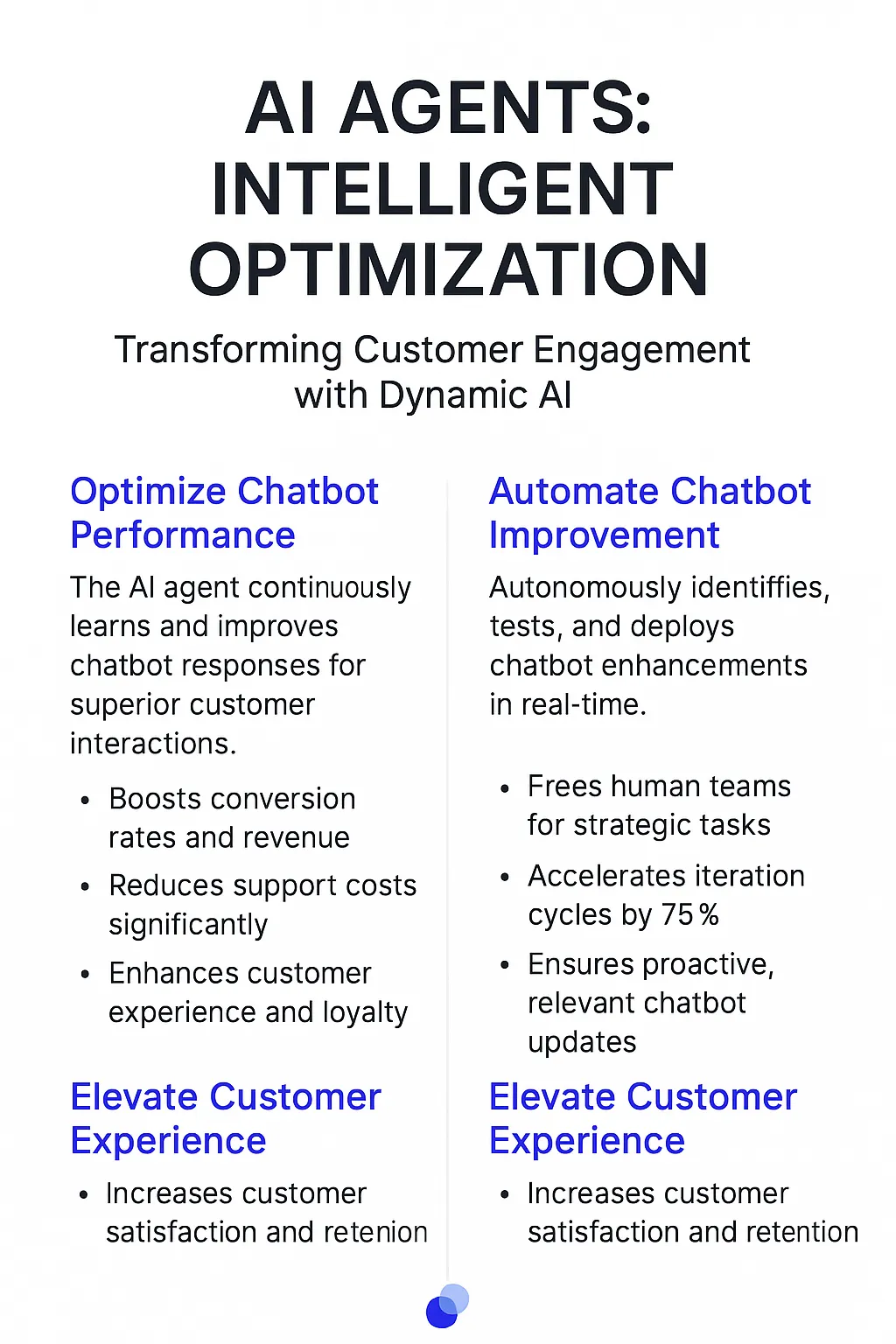Chatbot Conversation Optimization AI Agents
Revolutionizing Customer Interactions with AI-Powered Chatbots
What is Chatbot Conversation Optimization?
Chatbot Conversation Optimization is the process of enhancing chatbot interactions using AI to create more natural, context-aware, and effective conversations. It's about turning robotic exchanges into fluid dialogues that adapt to user needs in real-time. This technology leverages machine learning and natural language processing to understand user intent, personalize responses, and continuously improve based on each interaction.
Key Features of Chatbot Conversation Optimization
The core features that set optimized chatbots apart include:
- Context awareness: Understanding the nuances of user queries beyond simple keyword matching
- Personalization: Tailoring responses based on user history and preferences
- Continuous learning: Improving responses over time through machine learning
- Predictive capabilities: Anticipating user needs and offering proactive assistance
- Scalability: Handling multiple complex conversations simultaneously
- Multi-lingual support: Seamlessly communicating in various languages
These features combine to create chatbots that don't just respond, but engage in meaningful dialogue, driving user satisfaction and business outcomes.

Benefits of AI Agents for Chatbot Conversation Optimization
What would have been used before AI Agents?
Before AI agents entered the scene, chatbot conversation optimization was a manual, time-consuming process. Teams would pore over chat logs, trying to identify patterns and improve responses. It was like trying to solve a Rubik's cube blindfolded – you might eventually get there, but it's going to take a while and you'll probably mess up a few times along the way.
Companies relied on rule-based systems and decision trees, which were about as flexible as a brick wall. These systems couldn't adapt to new scenarios or understand context, leading to frustrating user experiences. It was the digital equivalent of those automated phone systems we all love to hate – press 1 for sales, 2 for support, 3 to scream into the void.
What are the benefits of AI Agents?
Enter AI agents, and suddenly we're playing a whole new ballgame. These digital teammates are like having a team of expert conversationalists working 24/7 to refine your chatbot's dialogue. They're constantly learning, adapting, and improving – it's like giving your chatbot a Ph.D. in human interaction.
One of the key benefits is the ability to handle context and nuance. AI agents can pick up on subtle cues in language that might fly over the head of a traditional chatbot. They're not just responding to keywords; they're understanding the intent behind the words. It's the difference between a chatbot that feels like talking to a particularly dim robot, and one that feels like chatting with a knowledgeable colleague.
Another major advantage is scalability. AI agents can handle an enormous volume of conversations simultaneously, learning from each interaction. It's like having a customer service team that gets smarter with every conversation, without needing coffee breaks or vacation time.
Personalization is another area where AI agents shine. They can tailor responses based on user history, preferences, and behavior patterns. It's like having a digital concierge who remembers every interaction you've ever had with a brand and uses that knowledge to provide a bespoke experience every time.
Finally, AI agents bring a level of predictive capability that's game-changing for businesses. They can anticipate user needs, suggest next best actions, and even identify potential issues before they arise. It's like having a crystal ball for customer interactions, allowing businesses to be proactive rather than reactive.
In essence, AI agents are transforming chatbot conversation optimization from a static, rule-based system to a dynamic, intelligent process that continually evolves. They're not just changing the game; they're rewriting the rulebook entirely.

Potential Use Cases of AI Agents for Chatbot Conversation Optimization
Let's dive into how AI agents can level up chatbot conversations. These digital teammates aren't just about automating responses - they're reshaping how businesses interact with customers at scale.
Processes
- Natural Language Understanding: AI agents can parse complex user queries, extracting intent and context to provide more accurate and relevant responses.
- Sentiment Analysis: By analyzing tone and emotion in user messages, AI can tailor responses to match the user's mood, creating more empathetic interactions.
- Conversation Flow Optimization: AI can dynamically adjust the conversation path based on user behavior, ensuring smoother dialogues and higher engagement.
- Multilingual Support: AI agents can seamlessly switch between languages, expanding the reach of chatbots to global audiences without the need for multiple specialized teams.
Tasks
- Personalized Product Recommendations: AI can analyze user preferences and browsing history to suggest relevant products, increasing conversion rates in e-commerce chatbots.
- Automated Appointment Scheduling: AI agents can handle complex scheduling tasks, considering multiple calendars and time zones to find optimal meeting times.
- Real-time Data Analysis: During conversations, AI can pull and analyze relevant data from various sources, providing users with up-to-date information and insights.
- Continuous Learning and Improvement: AI agents can learn from each interaction, constantly refining their responses and adapting to new user behaviors and preferences.
These AI-powered chatbots aren't just answering questions - they're creating experiences. They're turning what used to be frustrating automated interactions into genuinely helpful digital conversations that users actually want to engage with.
The real magic happens when these AI agents start to predict user needs before they're even expressed. Imagine a chatbot that knows you're about to ask about return policies because it's noticed you've been browsing reviews of a product you recently purchased. That's the kind of proactive, almost telepathic service that keeps users coming back.
But here's the kicker - the more these AI agents interact, the smarter they get. They're constantly learning, adapting, and improving. It's like having a customer service team that gets better with every single interaction, 24/7, without ever needing a coffee break.
This isn't just about making chatbots smarter. It's about fundamentally changing how businesses scale their customer interactions. With AI-optimized conversations, companies can provide personalized, high-touch service to millions of users simultaneously. It's the kind of leverage that can turn startups into unicorns and unicorns into tech giants.
The businesses that figure out how to harness these AI agents effectively won't just be improving their chatbots - they'll be redefining customer expectations across entire industries. And in the world of tech, that's where the real value is created.

Industry Use Cases
The versatility of AI agents in chatbot conversation optimization makes them valuable across various industries. Let's dive into some meaty, industry-specific use cases that showcase how AI can level up workflows and processes.
These aren't your run-of-the-mill chatbots. We're talking about sophisticated digital teammates that can parse context, understand nuance, and engage in meaningful dialogue. They're the secret sauce that's transforming customer interactions across sectors.
From e-commerce to healthcare, these AI-powered conversation optimizers are redefining what's possible in customer service, sales, and support. They're not just answering questions; they're predicting needs, personalizing experiences, and driving conversions in ways that would make even the most seasoned sales rep jealous.
So, buckle up. We're about to explore how these AI agents are becoming the unsung heroes in industries you might not expect, creating efficiencies and unlocking value in ways that are both subtle and profound.
E-commerce: Elevating Customer Experience with AI-Powered Chatbots
The e-commerce industry is ripe for disruption through chatbot conversation optimization. As someone who's seen countless startups rise and fall, I can tell you that the key to success in this space isn't just about having a chatbot—it's about having one that truly understands and adapts to customer needs.
Consider a high-end fashion retailer. Their chatbot isn't just answering basic questions about shipping times or return policies. It's a digital stylist, capable of understanding complex fashion preferences and making personalized recommendations. Through conversation optimization, this AI can learn to pick up on subtle cues in customer language, adjusting its tone from professional to casual based on the customer's style of communication.
But here's where it gets interesting: the AI doesn't just react, it proactively enhances the shopping experience. It might notice a customer frequently browsing evening wear and smartly suggest complementary accessories. Or it could detect hesitation in a customer's responses and offer more detailed product information or customer reviews to build confidence.
The real game-changer is the AI's ability to learn and improve over time. Each interaction becomes a data point, allowing the system to refine its understanding of customer preferences, common pain points, and effective selling strategies. This continuous optimization loop creates a flywheel effect, where better conversations lead to more sales, which in turn provide more data for further improvements.
For e-commerce businesses, this level of personalization and adaptability can significantly impact key metrics like conversion rates, average order value, and Customer Lifetime Value. It's not just about making sales; it's about creating a shopping experience so tailored and effortless that customers keep coming back.
In the end, chatbot conversation optimization in e-commerce isn't just a nice-to-have feature. It's a critical differentiator in a crowded market, turning casual browsers into loyal customers and transforming the online shopping experience. As we move further into the age of AI, the businesses that master this technology will be the ones leading the pack.
Financial Services: AI-Driven Chatbots Redefining Wealth Management
Let's talk about the wealth management industry. It's a space ripe for disruption, and AI-powered chatbots are leading the charge. But we're not talking about your run-of-the-mill chatbots here. We're talking about sophisticated digital teammates that are reshaping how high-net-worth individuals interact with their financial advisors.
Think about it. Traditional wealth management has always been high-touch, relying heavily on personal relationships. But what if we could scale that personalized experience using AI? That's where chatbot conversation optimization comes into play.
These AI-driven chatbots aren't just answering basic questions about account balances or stock prices. They're acting as the first line of defense for wealth managers, handling complex queries about market trends, portfolio performance, and investment strategies. They're analyzing vast amounts of financial data in real-time, providing insights that would take human advisors hours or even days to compile.
But here's where it gets really interesting. These chatbots are learning and adapting with every interaction. They're picking up on the nuances of each client's communication style, risk tolerance, and financial goals. Over time, they're able to tailor their language and recommendations to each individual client, mimicking the personalized touch of a human advisor.
For example, if a client consistently asks about socially responsible investments, the chatbot might start proactively suggesting ESG-focused funds. If another client shows a preference for technical analysis, the AI could adjust its communication style to include more charts and data-driven insights.
The impact on the wealth management industry could be profound. We're looking at increased efficiency, with chatbots handling routine inquiries and freeing up human advisors to focus on complex strategy and relationship building. We're seeing improved client satisfaction, as investors get instant, 24/7 access to personalized financial advice. And we're witnessing a democratization of high-quality financial guidance, as these AI systems make it possible to provide sophisticated advice at scale.
But let's be clear: this isn't about replacing human advisors. It's about augmenting them. The most successful firms will be those that find the right balance between AI efficiency and human expertise. They'll use chatbots to handle the heavy lifting of data analysis and routine communication, while human advisors focus on building trust, understanding complex life situations, and providing the emotional intelligence that AI (for now) can't match.
As we move forward, the firms that master this AI-human collaboration will have a significant competitive advantage. They'll be able to serve more clients, more effectively, while still maintaining the personal touch that's so crucial in wealth management. It's a classic example of technology not just incrementally improving an industry, but fundamentally reshaping it.
In the end, chatbot conversation optimization in wealth management isn't just about better customer service. It's about creating a new paradigm for financial advice - one that's more accessible, more personalized, and more powerful than ever before. The future of wealth management is here, and it's powered by AI.
Considerations
Technical Challenges
Building a chatbot conversation optimization AI agent is like trying to teach a computer to be a world-class improv comedian. It's not just about spitting out pre-programmed responses; it's about understanding context, timing, and the subtle nuances of human interaction.
One of the biggest technical hurdles is natural language processing (NLP). We're not just parsing keywords here; we're trying to decipher intent, emotion, and even sarcasm. It's the difference between understanding "I'm fine" as a genuine statement or a passive-aggressive brush-off.
Another technical beast to wrestle is the real-time learning and adaptation. A truly optimized chatbot needs to evolve with each conversation, picking up on user preferences and adjusting its approach on the fly. This requires a robust machine learning model that can process and apply new information without human intervention.
Data privacy and security also present significant technical challenges. As these AI agents become more sophisticated, they'll be handling increasingly sensitive information. Ensuring this data is encrypted, anonymized, and protected from breaches is crucial, especially in industries like healthcare or finance.
Operational Challenges
On the operational front, integrating a chatbot optimization AI into existing systems is like trying to teach a new language to your entire company overnight. It requires a fundamental shift in how teams approach customer interaction and data management.
Training is a massive operational challenge. Not just training the AI, but training your human team to work alongside it. You're essentially introducing a new team member that thinks and operates differently from everyone else. This requires a cultural shift and potentially new roles within the organization.
There's also the challenge of managing user expectations. As these AI agents become more advanced, users will expect increasingly human-like interactions. Balancing these expectations with the reality of what the technology can deliver is crucial. Overpromise and underdeliver, and you risk alienating your user base.
Finally, there's the ongoing challenge of quality control and Performance Management. How do you measure the success of an AI that's constantly evolving? Traditional metrics might not apply, and new frameworks for evaluation need to be developed and implemented.
In essence, optimizing chatbot conversations with AI is not just a technological upgrade - it's a fundamental reimagining of how businesses interact with their customers. It's a high-stakes game with potentially massive rewards, but it requires careful navigation of both technical and operational minefields.
The Future of Customer Engagement: AI-Powered Chatbot Optimization
Chatbot Conversation Optimization powered by AI agents is not just an incremental improvement - it's a paradigm shift in how businesses interact with customers at scale. By infusing chatbots with context awareness, personalization, and continuous learning capabilities, companies can provide high-touch, personalized service to millions of users simultaneously.
The impact of this technology extends far beyond customer service efficiency. It's reshaping user expectations, driving conversions in e-commerce, democratizing financial advice in wealth management, and creating new possibilities across industries. As AI continues to evolve, the businesses that master this technology will have a significant competitive edge.
However, implementing these AI-driven chatbots comes with its own set of challenges, both technical and operational. From natural language processing hurdles to the need for organizational adaptation, companies must navigate carefully to harness the full potential of this technology.
Ultimately, Chatbot Conversation Optimization represents a new frontier in customer engagement. It's not just about making chatbots smarter - it's about fundamentally changing how businesses scale their customer interactions, creating experiences that are more human, more helpful, and more impactful than ever before. The future of customer interaction is here, and it's powered by AI.













